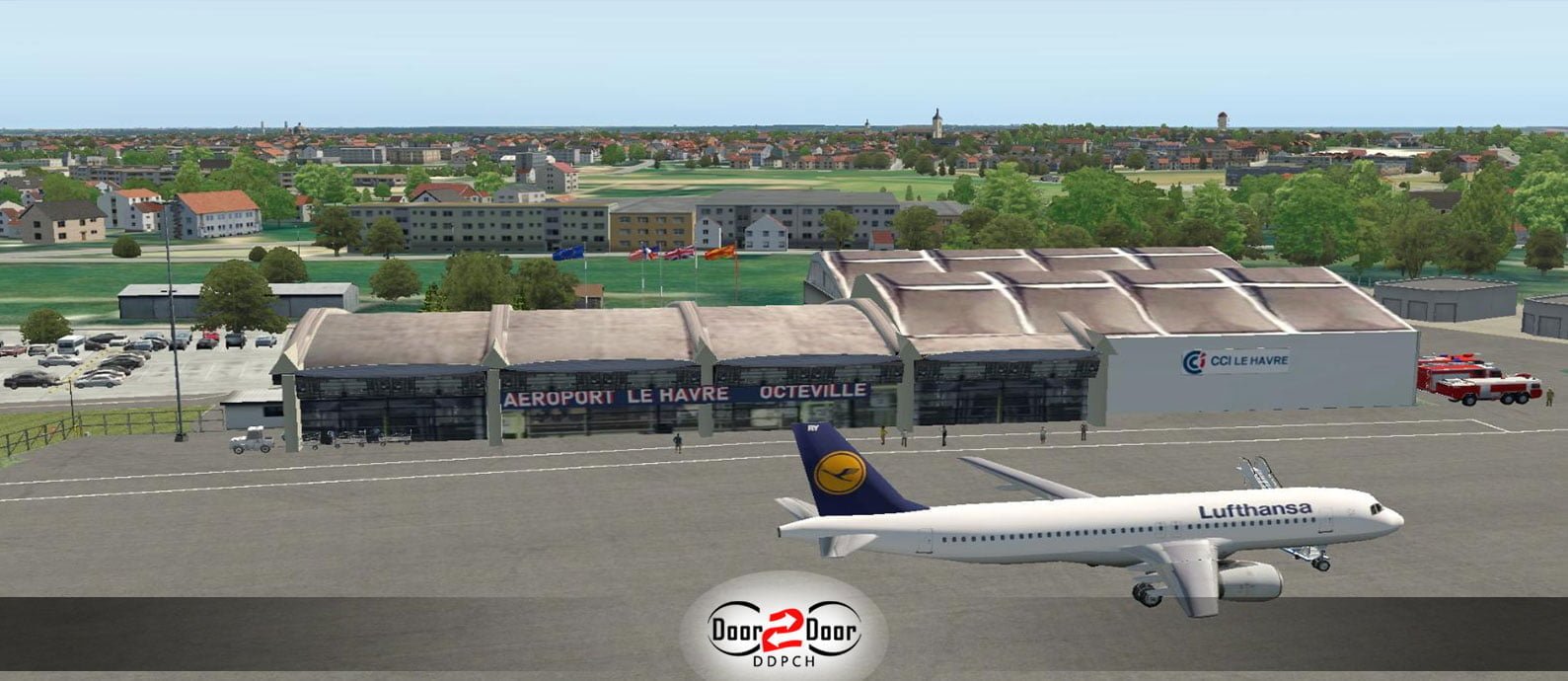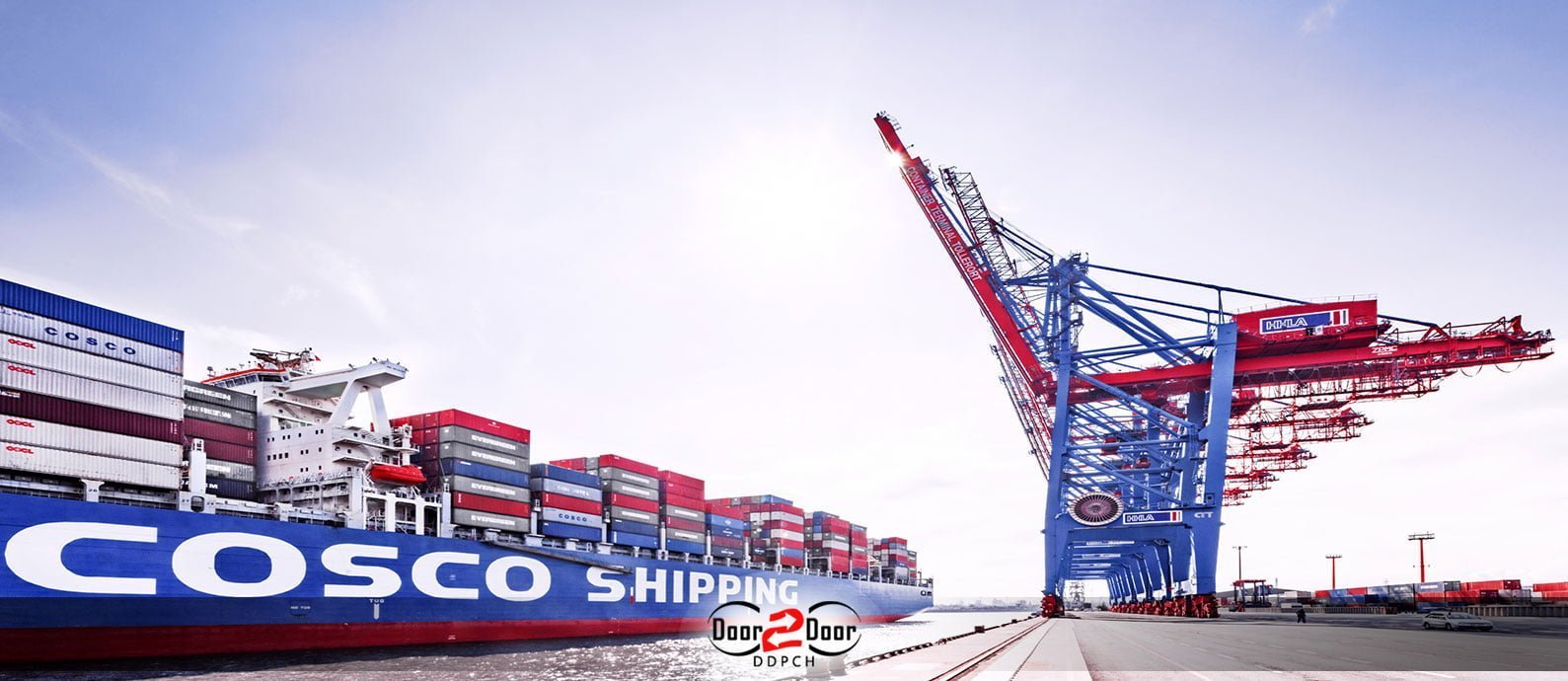Introduction for Shipping from China to Le Havre
Shipping from China to France, specifically to the picturesque port city of Le Havre, is a vital component of global trade, connecting the manufacturing powerhouse of China to one of Europe’s economic hubs. Whether you’re a business owner looking to shipping from China to Le Havre or an individual shipping personal items, understanding the process, costs, and regulations involved in this international shipping route is crucial.
As DDPCH, a trusted shipping company, we’re here to provide valuable insights to make this journey more manageable. Le Havre’s strategic location on the Atlantic coast and its proximity to Paris make it a prime destination for goods arriving from China.
In this guide, we’ll explore the essential aspects of this shipping route, including logistics, costs, and regulations. Whether you’re a business owner or an individual looking to transport goods, understanding these key factors is crucial for a smooth and cost-effective shipping experience.
Factors to consider when shipping from China to Le Havre
Shipping from China to Le Havre, France, is a complex endeavor that demands meticulous planning and consideration of several crucial factors. These factors can significantly influence the efficiency, cost, and success of your shipping operation. The history of shipping from China to Le Havre is a tale of centuries-old maritime trade evolving into a modern international shipping route. Le Havre’s strategic location along the Seine River and proximity to Paris made it an essential port for centuries.
The more recent history of trade between China and Le Havre can be traced back to China’s economic reforms in the late 20th century.
These reforms unleashed a wave of exports, including electronics, textiles, machinery, and more, destined for Le Havre. Today, Le Havre remains a pivotal entry point for Chinese goods into France and Europe, boasting state-of-the-art facilities and infrastructure tailored to global trade.
- Shipping Method: Selecting the appropriate shipping method is essential. Air freight is the fastest option, ideal for time-sensitive cargo, but it tends to be more expensive. Sea freight is cost-effective but has a longer transit time, suitable for bulk shipments. Rail transport offers a balanced approach, particularly for overland routes, offering competitive transit times and costs.
- Shipping Costs: Shipping costs encompass several components. Freight charges depend on the chosen shipping method and the weight or volume of the cargo. Customs duties and taxes vary based on the commodity and its declared value. Handling fees cover services like loading and unloading. A comprehensive understanding of these costs is crucial for accurate budgeting to prevent financial surprises.
- Customs Regulations: Both China and France have specific customs regulations governing imports and exports. Compliance with these regulations is imperative to avoid delays and potential confiscation of goods. Familiarize yourself with import/export requirements, documentation standards, and tariff classifications, as they can significantly impact clearance processes.
- Documentation: Accurate and complete documentation is the backbone of international shipping. Essential documents include commercial invoices, packing lists detailing contents and quantities, certificates of origin to prove the product’s source, and bills of lading or airway bills as proof of ownership. Errors or missing documents can lead to clearance delays, fines, or even rejection of the shipment.
- Cargo Packaging: Proper cargo packaging is vital to ensure goods arrive in optimal condition and meet safety regulations. Depending on the nature of your products, you may need specialized packaging, especially for fragile or perishable items. Labels and markings should be clear and compliant with international standards to facilitate handling and identification.
- Shipping Time: The choice of shipping method directly impacts shipping time. Air freight offers the quickest delivery, usually measured in days. Sea freight, on the other hand, can take several weeks due to longer transit times and port handling. Rail transport falls in between, with varying transit times depending on the route. Consider your cargo’s perishability, urgency, and lead times when selecting the most suitable option.
- Incoterms: Incoterms are internationally recognized terms of delivery that define the responsibilities and liabilities of buyers and sellers in the shipping process. They clarify who bears the costs and risks at different stages, such as loading, transport, and unloading. Selecting the appropriate Incoterms with your supplier or buyer is crucial to avoid misunderstandings and disputes during shipping

Choosing the best shipping method for Le Havre
When selecting the ideal shipping method for the China to Le Havre route, it’s crucial to strike a balance between the specific requirements of your cargo and your budget. Air freight, characterized by speed, is optimal for time-sensitive goods like electronics; whereas sea freight, though cost-effective, demands longer lead times, making it suitable for bulk shipments or items with less urgency. Additionally, consider factors such as environmental impact, infrastructure and accessibility at both ends of the route, risk management, and compliance with customs regulations and documentation requirements in both China and France to ensure a well-informed choice that aligns with your cargo’s unique needs and delivery timeline.
Air freight from China to Le Havre
While air freight offers many advantages, it’s essential to consider the cost, as it tends to be more expensive per unit of weight or volume compared to sea freight. Therefore, choosing air freight for your shipments to Le Havre should align with the specific needs of your cargo and your budget. Air freight from China to Le Havre offers several notable benefits for shippers looking to transport goods efficiently and swiftly:
- Speed: Air freight is the fastest shipping method available, with transit times typically measured in days rather than weeks. This speed is especially advantageous for time-sensitive cargo or products with short shelf lives, ensuring they reach Le Havre quickly.
- Reliability: Airfreight routes are often characterized by high levels of reliability and punctuality. Airlines adhere to strict schedules, minimizing the risk of delays due to factors like weather or port congestion.
- Global Reach: Air cargo services connect major cities worldwide, providing extensive reach for your shipments. This expansive network means you can transport goods from virtually anywhere in China to Le Havre with ease.
- Security: Airports maintain rigorous security measures, reducing the risk of theft or damage to your cargo. Additionally, air freight can be tracked in real-time, providing visibility throughout the shipping process.
- Reduced Inventory Costs: The shorter transit times associated with air freight can help reduce inventory carrying costs. Faster delivery means less need for safety stock, contributing to cost savings.
- High-Value Cargo: For high-value or luxury items, air freight offers enhanced security and peace of mind. Precious or sensitive cargo benefits from the reduced handling and lower risk of theft in the air transport process
Sea freight from China to Le Havre
While sea freight offers advantages, it’s essential to plan for longer transit times compared to air freight. Shippers must consider their cargo’s sensitivity to delivery time and balance the cost savings with the extended shipping duration. Additionally, thorough documentation and compliance with customs regulations are crucial for successful sea freight shipments from China to Le Havre. Sea freight from China to Le Havre offers numerous benefits, making it a preferred choice for many shippers:
- Cost-Effective: Sea freight is generally more budget-friendly than air freight, making it an economical choice for transporting large quantities of goods or bulk cargo over long distances.
- High Cargo Capacity: Sea vessels have ample space to accommodate substantial cargo volumes, making it suitable for businesses with significant shipping needs.
- Versatility: Sea freight can accommodate a wide range of cargo types, including oversized or heavy items that may be challenging to transport by air.
- Environmental Considerations: Sea freight is often considered more environmentally friendly due to lower carbon emissions per unit of cargo compared to air transport, making it a sustainable choice.
- Reduced Packaging Costs: Sea freight cargo typically undergoes less handling than air cargo, allowing for less robust packaging, which can lead to reduced packaging costs.
- Reliable Schedules: Ocean liners tend to follow regular schedules, providing a predictable and reliable shipping service. While transit times are longer, they are consistent.
DDP shipping from China to Le Havre
DDP shipping from China to Le Havre streamlines the entire logistics process, offering convenience, cost predictability, and risk mitigation. Shippers benefit from a hassle-free, efficient, and reliable solution for their international cargo transport needs. DDP (Delivered Duty Paid) shipping from China to Le Havre is a comprehensive logistics solution that offers several notable benefits for shippers:
- End-to-End Service: DDP shipping encompasses the entire shipping process, from pickup in China to delivery in Le Havre, including customs clearance and duties payment. This comprehensive service minimizes the burden on the shipper.
- Customs Expertise: DDP providers have a deep understanding of customs regulations and requirements in both China and France. They handle all customs documentation and procedures, reducing the risk of delays or compliance issues.
- Cost Transparency: DDP shipping typically includes all associated costs, providing shippers with a clear understanding of the total expenses involved in the transportation process, from shipping charges to customs duties.
- Reduced Administrative Work: Shippers can avoid the complexities of customs documentation, tariffs, and duties calculations, allowing them to focus on their core business activities while the DDP provider manages the paperwork.
- Risk Mitigation: DDP providers assume responsibility for the cargo’s safety and security during transit, minimizing the risk of damage or loss. This added layer of protection is especially valuable for high-value or delicate goods.
Express shipping from China to Le Havre
Express shipping from China to Le Havre is a premium and expedited logistics service designed to transport goods quickly and efficiently from the manufacturing hubs in China to the port city of Le Havre in France. This service is ideal for time-sensitive cargo and businesses that require rapid deliveries. Express shipping from China to Le Havre prioritizes speed and efficiency. It involves the use of dedicated and faster transportation methods, such as air freight or specialized expedited sea freight services. Additionally, express shipping providers typically offer streamlined customs clearance processes and priority handling at ports and terminals. Here’s an explanation of express shipping and its benefits:
- Speedy Delivery: Express shipping is the fastest way to transport goods from China to Le Havre. It ensures that your cargo arrives in a matter of days, making it ideal for time-critical shipments.
- Reliability: Express shipping services prioritize punctuality and reliability, providing peace of mind that your goods will reach Le Havre within the specified time frame.
- Reduced Inventory Costs: Faster transit times allow businesses to maintain lower inventory levels, reducing storage costs and capital tied up in stock.
- Supply Chain Efficiency: Express shipping can help businesses maintain efficient supply chains, respond quickly to market demand fluctuations, and meet tight production schedules.
- Reduced Risk of Damage: Expedited shipping often involves less handling of cargo, which can reduce the risk of damage during transit.
Road freight from China to Le Havre
Road freight from China to Le Havre involves transporting goods overland through a multi-stage journey. It begins in China, with cargo transported by road to Central Asian countries like Kazakhstan or Uzbekistan, often entailing long-haul trucking. In Central Asia, the cargo is transshipped from road to rail for a more efficient journey. It then proceeds through Europe via established rail routes, crossing multiple borders along the way. Finally, in France, the cargo continues by road, passing through Western European countries like Germany and Belgium before reaching Le Havre, its ultimate destination. This overland route offers a cost-effective and flexible alternative for goods traveling great distances between China and Le Havre.
- Cost-Effective: Road freight can be a cost-effective option, particularly for large volumes of goods, as it often involves standard trucks and well-established road networks.
- Flexible Routes: Road freight offers flexibility in choosing routes, allowing shippers to adapt to specific needs and transit times.
Reliable Transit Times: Road transport within Europe is known for its reliability and efficient border crossings, contributing to consistent transit times. - Access to Inland Areas: Road freight allows for the delivery of goods to destinations beyond major ports, providing access to customers in inland areas.
- Reduced Handling: Compared to multiple handling points in sea or air transport, road freight often involves fewer transfers, which can reduce the risk of damage or loss.
Rail freight from China to Le Havre
Rail freight from China to Le Havre follows a well-established and expanding network of rail routes connecting Asia and Europe. The primary route, known as the “China-Europe rail corridor,” spans thousands of miles across Eurasia, passing through countries such as Kazakhstan, Russia, Belarus, and Poland before entering Western Europe. This transcontinental network offers businesses a cost-effective and efficient means of transporting goods between China and Le Havre, France, with the flexibility to reach various destinations across Europe. The rail routes are continually evolving, with ongoing infrastructure development and improvements, making rail freight an increasingly attractive option for shippers seeking timely and economical transportation solutions.
- Cost-Effective: Rail freight can provide significant cost savings compared to air freight while still offering faster transit times compared to sea freight. It strikes a balance between cost and speed, making it an economical choice for many shippers.Efficient
- Transit Times: Rail transport offers faster transit times than sea freight, particularly for long-distance shipments. This can be crucial for businesses looking to balance cost considerations with timely deliveries.
- Reliability: Rail freight routes are often well-established and reliable, with consistent schedules and fewer disruptions due to weather conditions or congestion compared to road transport.
- Reduced Environmental Impact: Rail transport is more environmentally friendly than some other modes of transportation, such as air freight, as it typically results in lower carbon emissions per unit of cargo.
- High Capacity: Rail freight can handle large cargo volumes efficiently, making it suitable for transporting bulk goods, manufactured products, and raw materials.

Air Freight vs. Sea Freight to Le Havre
Choosing between air freight and sea freight to ship goods to Le Havre depends on various factors. Air freight is the fastest option, ensuring rapid delivery, making it suitable for time-sensitive cargo. In contrast, sea freight is more cost-effective, ideal for bulk shipments or goods with less urgency. While air freight offers quick transit times, it comes at a higher price, while sea freight, while slower, provides budget-friendly transport. The choice hinges on the nature of the cargo, budget constraints, and the balance between speed and cost that best aligns with the specific shipping needs to Le Havre, France. Here’s a real-life example comparing the cost and transit time for air freight and sea freight for shipping goods from Shanghai, China, to Le Havre, France:
Scenario: Shipping Electronics to Le Havre
Air Freight:
- Transit Time: Air freight from Shanghai to Le Havre typically takes around 3-5 days for door-to-door delivery.
- Cost: The cost of air freight for a shipment of 1,000 smartphones weighing 1,000 kilograms might range from $15,000 to $20,000 USD, depending on various factors such as cargo volume, carrier choice, and shipping urgency.
- Advantages: Air freight ensures rapid delivery, allowing the company to meet a tight product launch schedule and quickly respond to market demand.
- Disadvantages: The higher shipping cost reduces profit margins, but the benefits of timely delivery outweigh the expense for time-sensitive products like smartphones.
Sea Freight:
- Transit Time: Sea freight from Shanghai to Le Havre typically takes around 25-30 days for door-to-door delivery, considering both sea transit and port handling times.
- Cost: The cost of sea freight for the same shipment of 1,000 smartphones weighing 1,000 kilograms might range from $5,000 to $8,000 USD, depending on factors like container type (Full Container Load or Less than Container Load), shipping line, and other charges.
- Advantages: Sea freight offers significant cost savings, making it an attractive option for bulk shipments or products with less time sensitivity.
- Disadvantages: The longer transit time could result in missed market opportunities, especially for time-sensitive product launches, and necessitate more extensive inventory management.
In this real-life example, air freight ensures a swift response to market demand but comes at a higher cost, while sea freight offers cost savings but requires longer lead times, emphasizing the trade-off between transit time and shipping cost when making shipping decisions for specific cargo.
Estimated Costs and Transit Time for Shipping to Le Havre
When shipping from China to Le Havre, France, various transportation methods offer different costs and transit times to cater to diverse business needs. Air freight, while the fastest option, typically takes 3-5 days but comes at a higher cost, ideal for urgent and time-sensitive shipments. Sea freight, on the other hand, offers cost-effective solutions with transit times of approximately 25-30 days, making it suitable for bulk shipments or products with less urgency. Express shipping provides expedited services, balancing speed and cost efficiency. DDP (Delivered Duty Paid) shipping includes comprehensive logistics solutions, ensuring end-to-end service with cost predictability. Rail and road freight present alternative options, each with its advantages, such as cost-effectiveness and access to inland areas. Shippers must consider the nature of their cargo, budget constraints, and delivery timelines when choosing the most suitable method for shipping to Le Havre.
Please keep in mind that these are rough estimates, and actual transit times and costs may vary depending on factors like cargo volume, weight, carrier choice, shipping urgency, and specific routes. It’s essential to obtain accurate quotes from shipping providers based on your unique shipping requirements.
Essential Documentation for Shipping to Le Havre
When shipping goods to Le Havre, France, or any international destination, having the right documentation is crucial to ensure a smooth and compliant shipping process. France, as part of the European Union, has specific customs and regulatory requirements that shippers must adhere to. To prepare documentation for shipping from China to Le Havre, France, begin by creating a comprehensive commercial invoice that includes buyer and seller details, detailed descriptions of the goods, their values, payment terms, and Incoterms.
Here are the essential documents required for shipping to Le Havre, considering various shipping methods:
1. Commercial Invoice:
- For All Methods: The commercial invoice should include details such as the buyer and seller’s information, a detailed description of the goods, their unit value, total value, currency, and payment terms. It is essential for customs valuation and determines the import duties and taxes.
2. Bill of Lading (B/L) or Airway Bill (AWB):
- Sea Freight: A Bill of Lading (B/L) is issued for sea freight shipments. It serves as evidence of the cargo’s receipt, the contract of carriage, and a document of title to the goods, enabling their release at the destination port.
- Air Freight: An Airway Bill (AWB) is used for air freight. It serves as a receipt and a contract of carriage, but unlike a B/L, it doesn’t confer ownership of the goods.
3. Packing List:
- For All Methods: A packing list provides a detailed breakdown of the contents of each package, including their weight, dimensions, and packaging type. This document assists customs officials in cargo inspection and verification.
4. Certificate of Origin:
- For All Methods: The Certificate of Origin specifies the country where the goods were produced or manufactured. It is essential for determining applicable trade agreements, tariffs, and import duties.
5. Transport Insurance Certificate:
- For All Methods: While not mandatory, insuring your shipment is advisable to protect against potential loss or damage during transit. The insurance certificate serves as evidence of coverage and outlines the terms and conditions of the insurance policy.
6. Import Licenses and Permits:
- For All Methods: Certain goods, such as controlled substances or restricted products, may require specific import licenses or permits. Shippers must verify whether their cargo falls into this category.
7. EUR.1 Certificate (for Preferential Tariffs):
- For Sea Freight: When eligible, an EUR.1 certificate can be used to claim preferential tariff rates under trade agreements between the European Union and other countries.
8. DDP (Delivered Duty Paid) Documentation:
- For DDP Shipments: In the case of DDP shipping, which includes customs clearance and duty payment, additional documentation may be necessary, such as import licenses, tax registrations, and compliance with local regulations to ensure all duties and taxes are settled by the shipper.
9. Proforma Invoice (for Express Shipping):
- For Express Shipping: A proforma invoice is often required for express shipments, outlining the value of the goods and the terms of the sale. It helps customs officials assess the shipment’s value quickly.
Properly preparing and submitting these documents is vital for a successful shipping process to Le Havre, France, regardless of the chosen shipping method. Working closely with experienced freight forwarders or shipping providers can help shippers navigate the complexities of international shipping and ensure compliance with French customs regulations.
Reviewing Top Shipping Providers for Le Havre
Reviewing the top shipping providers for Le Havre, France, is essential for making informed decisions when selecting a partner for your cargo shipments. Shipping providers are essential facilitators of international trade and logistics for a multitude of reasons. First and foremost, their expertise and industry knowledge are paramount in navigating the intricacies of global shipping regulations, customs procedures, and the labyrinth of documentation requirements. By serving as experienced guides through the complex international trade landscape, they ensure that shipments adhere to all necessary legal protocols, thereby reducing the risk of delays, errors, and costly penalties.
Secondly, shipping providers boast extensive global networks that are instrumental in optimizing the efficiency and reliability of cargo transportation. Their vast reach ensures that goods can traverse the globe swiftly and securely. These providers maintain partnerships with carriers worldwide, granting access to a multitude of shipping routes and options. This network not only expedites the shipping process but also enhances flexibility, enabling shippers to choose the most suitable and cost-effective solutions for their specific needs.
These providers offer various benefits, and the choice depends on your specific shipping needs, cargo type, budget, and preferred services. It’s advisable to contact them directly or work with a freight forwarder to determine the best fit for your Le Havre-bound shipments.
How to Handle Customs Clearance in Le Havre ?
Handling customs clearance in Le Havre, France, is a crucial step in international trade that requires attention to detail and compliance with customs regulations. To navigate this process successfully, it’s essential to work with experienced customs brokers or shipping providers who are well-versed in the specific requirements of Le Havre’s customs authorities. Customs clearance involves a series of steps, including submission of required documentation, payment of customs duties and taxes, and inspection of the goods by customs officials.
It’s important to ensure that all documentation, such as the commercial invoice, bill of lading, packing list, and certificate of origin, is complete and accurate. Here is a step-by-step guide to handling customs clearance in Le Havre:
Step1: Engage a Customs Broker or Shipping Provider:
Start by partnering with a customs broker or a shipping provider with expertise in Le Havre’s customs procedures and regulations. They will serve as your intermediary with customs authorities and ensure compliance throughout the process.
Step2: Documentation Preparation:
Begin by gathering and organizing all the necessary documentation. This includes:
- Commercial Invoice: Ensure it contains accurate information about the goods, their value, and transaction details.
- Bill of Lading: Verify that it matches the commercial invoice and includes all shipment details.
- Packing List: List the contents of each package with precise weight, dimensions, and packaging type.
- Certificate of Origin: Obtain this document if required to confirm the origin of your goods.
- Any Additional Documentation: Depending on the nature of your cargo, you may need other specific documents or permits.
Step3: Submit Customs Declaration:
Work closely with your customs broker or shipping provider to complete and submit the necessary customs declaration forms. In France, this often involves filing the Single Administrative Document (SAD), which provides essential information about your shipment.
Step4: Payment of Duties and Taxes:
Calculate and pay any customs duties, taxes, or fees applicable to your shipment. Your customs broker will help determine the exact amounts and facilitate the payment process.
Step5: Cargo Inspection:
Be prepared for customs officials to inspect your cargo. Customs inspections are random but can also occur based on specific suspicions or discrepancies in your documentation. Cooperate fully during these inspections to expedite the process.
Step6: Release of Goods:
Once customs clearance is granted, you’ll receive authorization to release your goods. This step allows your cargo to continue its journey to its final destination.
Step7: Compliance with Import Regulations:
Ensure that your shipment complies with any import regulations or licenses required for specific types of goods. Failure to meet these requirements can result in delays or even seizure of your cargo.
Step8: Record Keeping:
Maintain thorough and organized records of all customs documentation and financial transactions. Proper record-keeping is essential for auditing purposes and to demonstrate compliance.
Step9: Consult with Experts:
Throughout the customs clearance process, don’t hesitate to seek guidance and assistance from customs experts, your customs broker, or your shipping provider. They can address any challenges, answer questions, and ensure a smooth customs clearance experience.
By following these detailed steps and collaborating closely with experienced professionals, you can successfully navigate customs clearance in Le Havre, France, ensuring that your cargo complies with all regulations and smoothly continues its journey to its intended destination.

Avoiding Common Mistakes When Shipping to Le Havre
Avoiding common mistakes when shipping to Le Havre, France, is essential for a smooth and trouble-free logistics experience. Shippers often face challenges related to incomplete or inaccurate documentation, failure to comply with import regulations, incorrect cargo classification, insufficient insurance coverage, overlooking customs clearance procedures, inadequate packaging and labeling, and neglecting environmental and sustainability regulations.
To steer clear of these pitfalls, meticulous preparation and attention to detail are paramount. By ensuring accurate paperwork, compliance with regulations, proper cargo classification, adequate insurance, expert guidance for customs clearance, appropriate packaging and labeling, and adherence to sustainability practices, shippers can navigate the complexities of shipping to Le Havre successfully, minimizing delays, financial risks, and environmental impacts.
By identifying and addressing these common mistakes with the suggested solutions, shippers can enhance the efficiency.
Conclusion: Simplifying Shipping from China to Le Havre
Simplifying shipping from China to Le Havre involves navigating various complexities and considerations. Selecting the right shipping method based on cargo type, urgency, and budget constraints is paramount. Whether it’s air freight for speed or sea freight for cost-effectiveness, careful planning ensures timely delivery. Calculating shipping costs accurately, including freight charges, customs duties, taxes, and handling fees, is essential to avoid unexpected financial surprises along the way. Understanding and complying with customs regulations in both China and France is crucial to prevent delays or issues with goods clearance.
DDPCH’s comprehensive services extend beyond the basics. We take pride in not only avoiding common mistakes but also proactively addressing them, ensuring that your cargo reaches Le Havre without hiccups. Our commitment to sustainability and eco-friendly practices further reinforces our dedication to responsible shipping. For more in-depth information on shipping from China to Dunkirk and Rouen , visit our blog at DDPCH for comprehensive insights and expert advice.
The main shipping methods for cargo from China to Le Havre include air freight, sea freight, rail transport, DDP,Express, and road freight. The choice depends on factors such as the type of cargo, urgency, and budget constraints.
The typical transit time for sea freight from China to Le Havre is approximately 30 to 40 days, although this can vary depending on the specific shipping route and port conditions.
Air freight from China to Le Havre offers the benefit of speed, making it an ideal choice for time-sensitive shipments. It ensures quick delivery of goods to their destination in Le Havre.
Incoterms are international commercial terms that define responsibilities and liabilities during shipping. They are essential for clarifying who is responsible for costs and risks at each stage of the shipment, providing clarity and avoiding disputes between parties.
To calculate shipping costs accurately, consider all associated expenses, including freight charges, customs duties, taxes, handling fees, and any other costs related to the shipment. Consult with experts or use shipping cost calculators for precise estimates.
Essential shipping documents include a commercial invoice, bill of lading, packing list, certificate of origin, and any additional documentation specific to the goods being shipped. Accurate and complete documentation is crucial for a smooth shipping process.
To prepare for cargo inspections, maintain accurate documentation, ensure that goods are properly packed and labeled, and cooperate fully with customs officials during inspections. Compliance with customs regulations is essential to expedite the process.
Selecting a reputable shipping provider is vital because they possess the knowledge, experience, and network to navigate the complexities of international shipping. A trusted provider ensures a smooth and reliable shipping process from China to Le Havre, minimizing risks and delays.





